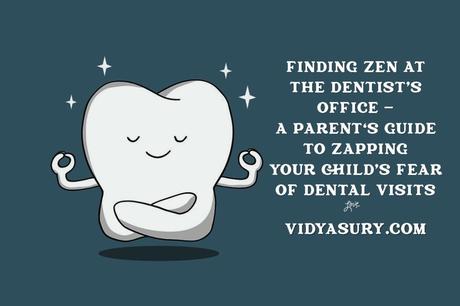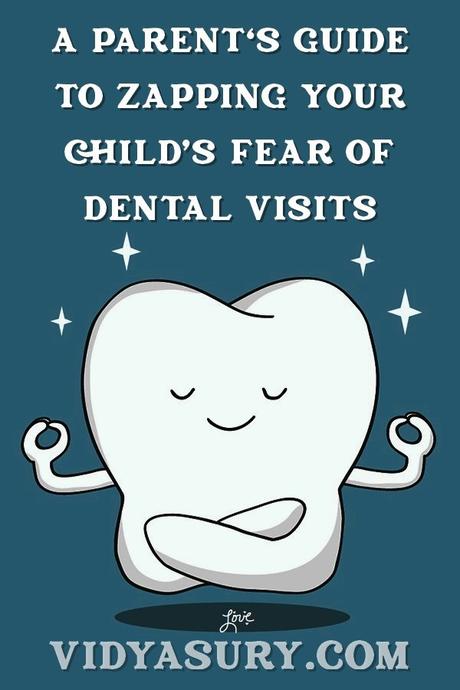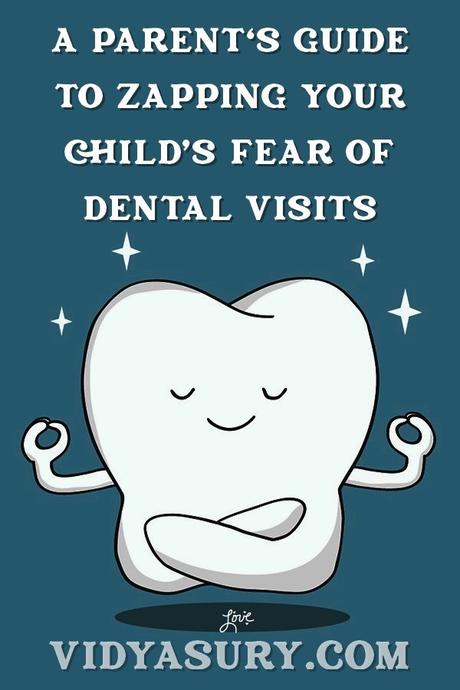
Ever heard of white coat syndrome? It is the fear of visiting doctors (and of course, dental visits).
Or just about anyone wearing a white coat.
Now most adults are terrified of dental visits-so let us not even talk about kids. To prepare them for their first, second or subsequent dental visit, parents can take measures beforehand and vanquish that fear for good.
After all, oral care is important and dental visits are unavoidable-so why not make it a happy one?
Kids must be handled with kid gloves. Gently. Clinics are places where a child naturally feels vulnerable. Fortunately, it needn't always be clouded with unpleasant memories.
Why Do Kids Fear Dental Visits?
Visiting a dentist office is invariably scary as your child may have some kind of negative association with it. Some common reasons are:
1. Bitter Experience with First Dental Visit
If a child has had an unhappy experience the first time, the second dental visit is naturally unappealing. This makes them fear the place. Parents often take their children to a dentist office for a fluoride varnish or prophy paste procedure. If the dentist or oral hygienist uses a fluoride varnish or prophy paste that does not taste good, the child usually does not like the procedure.
So, while visiting the dentist make sure they use the best tasting prophy paste and fluoride varnish. One of the companies that has the best reviews on taste is Wonderful Dental. If your dental office does not carry their dental products ask them to request prophy paste samples; they are free for dentists. Children usually love chocolate, bubblegum, or strawberry flavors. So, your child has a choice to pick from. Every time we visited our dentist with our son, he always offered him a choice of flavors and joked with him, making it fun.
2. Fear of Pain and Unfamiliar Environment
Dentists use sharp, pointed, metal tools and when they bring them close to our mouth, they look frightening. We associate such objects with pain. That is why just looking at the tools can be scary for children.
Also, a dental office is often sterilized with a smell that is alien and disagreeable to children. This makes them uncomfortable. Also, there might be noises of drilling or surgeries which sound horrifying enough.
The soundscape and the environment are totally new to our vulnerable little humans and their defense mechanism kicks in. They begin to fear and make a fuss to leave the place.
3. Fear of Breathing Obstruction
This is the most common fear. Having difficulty with breathing is a primal fear. Some kids are mouth breathers. They do not breathe through the nose habitually. So when they sit in that chair and open their mouth, they subconsciously face difficulty with breathing which terrifies them.
4. Parents Nervous Behavior
Parents are humans too and children tend to imitate their parents. The nervousness of a parent before a visit to the dentist can rub off on the child.
How to zap your child's fear of dental visits?


As a parent, it is important to make your child understand why dental visits are important so they can fight the fear. Here are six easy tips to put them at ease:
1. Start Early
Familiarize your child with the dentist's office and talk to them about dental procedures in language they can understand. This will prepare them better and keep that fear off. About the time they turn one, or when the first tooth appears-whichever is earlier-bring them to the dentist for a check up. Look for a child-friendly dentist. Pediatric dentists and family dental practices can set your child at ease and probably even make them enjoy their day out. Most pediatric dentists have attractive pictures on their walls to distract the young ones.
2. Talk to your child
Make it simple, make it fun. Help them understand that oral hygiene is important and regular dental care will keep their teeth healthy. As for what happens at the dentist, the tools, etc., leave it to the dentist to explain. Focus on talking about maintaining a beautiful smile, strong teeth and preventing cavities.
Parents tend to tell their children to be brave before visiting the dentist. Avoid saying this-as it implies that it will be painful. Just assure them that it is a safe place and necessary to visit every six months for regular dental check ups. Do not bribe them. Do not be overly worked up before the visit. Just treat it as a part of your routine.
3. Do not take them with you when you visit the dentist
Dental clinics for adults tend to be somewhat sober, while pediatric dentists create a cheerful and bright ambiance for children with colorful décor, toys, and other entertaining props. A regular dentist's clinic often has the sound of drilling and expressions of pain from those going through various procedures. No need to expose them to it when they are young.
4. Use role-play
Children enjoy playing games, especially with their parents. Why not get them a toy dental kit and take turns to be the dentist? This is a great way to explain what happens at the dentist's and let them know what to expect when a real visit happens.
5. Set a good example
Children see, children do. They learn from their parents. Make them comfortable with dental visits by being a good example. When your own visit is due, even if you are stressed, try not to show it. Look after your teeth so they can do the same. If you expect them to brush twice a day, show them that you follow this routine, too.
6. Meditation
I know-you are wondering why I suddenly snuck in meditation as a tip. The thing is, despite everything, if your child is still anxious, you have to use some relaxation technique to calm them down. This can be as simple as deep breathing, meditation, playing a game to distract them from their anxiety, bringing their favorite toy or book along, and so on. Your dentist may suggest safe mild sedation or local anesthesia.
However, children are usually quite brave and curious and take a visit to the dentist in their stride quite happily.
Helping your child follow proper dental care
Our mouth is literally the doorway to our inner body. It keeps tabs on our future health blueprint. It is true that dental health impacts overall health. From the way a child is breastfed, her breathing pattern, eating habits, sleeping ritual-everything influences her oral health.
Dental care is more than just a pretty set of teeth; it is also about their alignment, their position, each tooth's health (cavities) and the child's digestion. This is why it is crucial to make consistent oral care a habit from a young age.
This means brushing properly, flossing, and other rituals with the right toothbrush, toothpaste, floss, mouthwash and more.
Also choose your dentist carefully. There are different types of dentists. One group focuses on airway and practice in the etiology of narrow cavities, which is a critical segment and can be helpful for your child.
Discuss dental treatments and procedures like fluoride varnish, braces, and whitening with the dentist. Figure out if your child's teeth need any special care or if they are prone to cavities. Ensure that they use the best tasting prophy paste and fluoride varnish with the right tools and products specially made for children.
Finally...
Remember that not every child fears dental visits. They usually develop that feeling by association-watching others freaking out about it. Most of them have no idea what is involved. But yes, explaining what to expect before going to the dentist in a positive way is a smart move. My son used to be excited thinking about the strawberry flavor and that made him quite enthusiastic about looking after his teeth properly. We are also fortunate to have a family dentist who is kind to children and is wonderful at explaining dental care and its consequences.
Is your child afraid to go to the dentist? How do you manage the fear?
